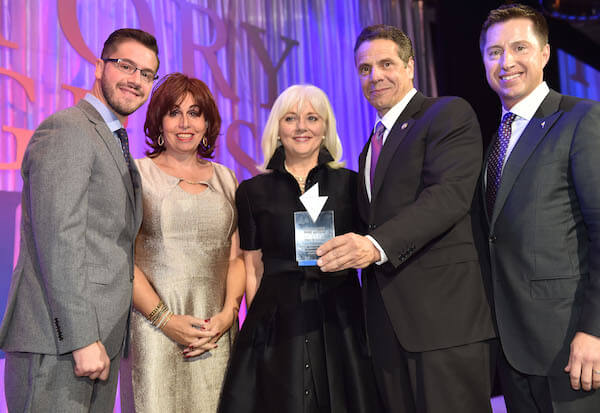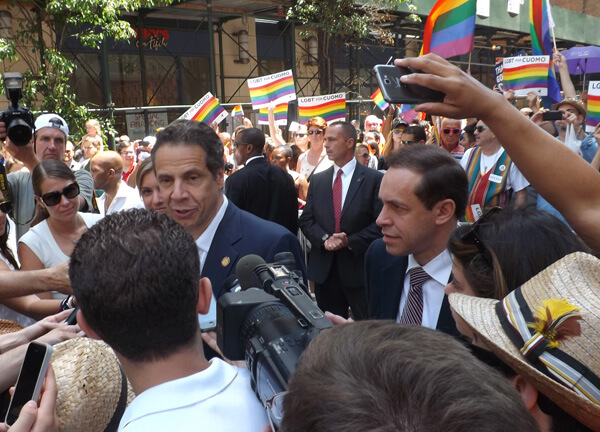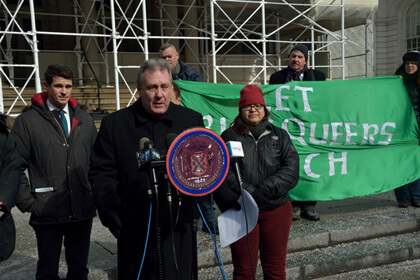State Senator Brad Hoylman said his thinking on conversion therapy was shaped by input from a constituent, Dean Dafis (pictured), who suffered through it as a teenager.
While California’s 2012 first-in-the-nation law to ban therapists from trying to turn gay minors into heterosexuals is being challenged in federal court, similar legislation was just introduced in the New York State Legislature — though without the backing of a strong coalition of LGBT and mental health groups. Its prospects in Albany are uncertain, sponsors said, but they wanted to get the ball rolling.
The bill, introduced by two West Side Democrats — out lesbian Assemblywoman Deborah Glick on April 29 and out gay Senator Brad Hoylman on May 1 — prohibits “mental health professionals from engaging in sexual orientation change efforts with a patient under the age of eighteen years.”
If found to have engaged in what the bill defines as “professional misconduct,” therapists in violation could lose their licenses.
Local gay activist who suffered electroshock treatments was an impetus to action in NYS
Glick heads the Higher Education Committee, to which her bill was referred, and said, “I have a relatively good feeling about it getting out of committee,” though it might have to go next to the Codes Committee “since it deals with a sanction.” She added ruefully, “Lots of things go to Codes to die.”
Glick said she was motivated by the plight of homeless gay youth who are expelled by their families.
“We want to ensure that young people aren’t given negative messages that undermine their self-esteem,” she explained.
The justification section of the bill says that “being lesbian, gay, or bisexual is not a disease, disorder, illness, deficiency, or shortcoming” and that the mental health establishment has “recognized this fact for nearly forty years.” It cites the many professional associations that have condemned “reparative” or “conversion” therapies as “dangerous” treatments.
The Empire State Pride Agenda did not have this bill on its list of priorities at its annual lobby day on April 30 in Albany, but Hoylman said he spoke about it in his speech to activists gathered there that day. George Simpson, ESPA’s communications manager, did not make anyone from the group available to discuss the legislation and whether they will get behind it, but wrote in an email, “We support efforts to ban the abuse of minors under the fraudulent promise of ‘curing’ them.”
The bill was not introduced with a press conference or gathering of LGBT and mental health profession backers.
“I have learned that if you wait for the macro strategists on whether to proceed or not, nothing will happen,.” Hoylman said. “A lot of people said that Mary Bonauto [of the Gay & Lesbian Advocates & Defenders] should not have filed the marriage case” in Massachusetts that emerged victorious in 2003.
Asked about the pending court case in California and how it might impact the New York bill, Glick said, “We don’t sit on our hands waiting to see what happens somewhere else. If as a result of that case there is some language that would mitigate a negative response, we would look at it. I am not in the business of predicting failure.”
She said that she has “gotten some positive responses from different [mental health] associations,” but doesn’t have a timeline for getting the bill done. “We have to do some consciousness-raising,” Glick said.
Dr. Jack Drescher, a prominent New York out gay psychiatrist, told Gay City News he “wasn’t consulted” before the bill was introduced. While he has led efforts at the American Psychiatric Association to study and curb conversion therapy, he voiced misgivings about the California bill in comments to the newspaper in October.
“The law makes people feel good,” he wrote in an email at that time, “but doesn’t solve problems of unlicensed therapists who do this. And I’m not sure it is constitutional. If it gets overturned it will be a victory for anti-gay organizations. It will be a setback for the public in education about the harm of ‘conversion therapy.’”
When the California law was challenged in court, however, Drescher filed an amicus brief defending it and is testifying on May 15 before the New Jersey Assembly in favor a similar bill. (Massachusetts is the other state considering a ban.)
He continues to express some qualms about the potential for backlash. “Despite the problems, a decision by the court that the California law is unconstitutional would be a public relations debacle,” validating the therapy and emboldening its practitioners on the religious right, he said.
But Drescher is now persuaded that these laws can help. “If you’re a person looking into the therapy from a curious position, you’ll see it is outlawed and that could have an inhibitory effect,” he said.
He supports the effort Glick and Hoylman are waging in New York.
Dr. George Weinberg, author of the groundbreaking “Society and the Healthy Homosexual” in 1972, is a strong supporter of the ban on the practice. “I think of reparative therapists as social orthodontists,” he told Gay City News. “They want people to be all the same — straight, white, and interchangeable. The narrower their definition of health, the more needed they are.”
Hoylman said he got involved in the issue through “a constituent who had been subjected to conversion therapy and is now out and proud.”
That constituent, Dean Dafis, 43, an attorney and marriage equality activist in New York, referred Hoylman to the Southern Poverty Law Center, which has been active in fighting the discredited therapy.
“When I came out to my family — from a pious Greek Orthodox culture — around age 12, they had a hard time with it and hoped it would go away,” Dafis told Gay City News. They sent him to a family counseling and Christian group in Philadelphia.
“This guy claimed he could convert homosexuals depending on where they fell on the spectrum of homosexuality, and after a few conversations he felt I was a good candidate,” Dafis recalled. “At times it was benign talk so he could get me to trust him, but at times it got harmful. Electroshock was part of it, and my family said they were willing to try it. It also consisted of how to act like a man, speak like one, and increase masculinity by working out, going to the gym more often, having a girlfriend. I didn’t even know what being gay meant at the time and I didn’t quite understand my sexual fantasies.”
Dafis was shown pornographic images of men and received shocks “when it was clear I was stimulated by the images,” he said, explaining, “The idea was to nurture my brain to associate this as a bad thing so that eventually I would suppress any such desires.”
The shocks, Dafis asserted, were not physically harmful, but he said, “I became emotionally and psychologically damaged for years after, very insecure not just about my sexuality or masculinity but generally very lost as to who I was or who I could be as a person in society. I even went to the great length several years later of getting married to a woman in order to deny my truth.”
Dafis said that when he went home crying from the electroshock treatment, “that part stopped,” but the overall therapy continued for two years “and eventually I said I wouldn’t go anymore. My family relationship deteriorated.” He left home at 14.
“I bummed around, spending a week here and a week there with friends,” he said. “I went home six months later and engaged in very self-destructive behavior, and I was very rebellious against everyone. My parents took me and my younger brother back to Greece.”
Dafis finished high school there and returned to the United States five or six years later, eventually becoming an attorney and gay activist with Marriage Equality New York (now Marriage Equality USA).
“Conversion therapy sounds innocuous,” Dafis said. “Embedded in it is the idea that you can change something that is not good. I was very fortunate. I was strong enough to get through it, but there were lots of moments where I considered suicide. I told the therapist, and he said that that was ‘drastic’ and asked, ‘Is there anything I can do to make you more comfortable?’ And I said, ‘Yes, stop this.’ I left at that point.”
Dafis thinks the legislation is “a no-brainer” and that conversion therapy should also be banned from being practiced on adults. But Hoylman said, “We feel that the age of consent is 18, and that seems like a natural point when people can make up their own minds” about whether to subject themselves to such treatment.
The California law, which has gotten contradictory rulings from two federal judges, was heard by a three-judge appeals panel of the Ninth Circuit on April 17 that weighed whether it was “an unjustified infringement on free speech or a valid effort to prevent therapeutic malpractice,” the New York Times reported.
Brad Dacus of the Pacific Justice Institute, which is challenging the law, told the Times their case is “about protecting the First Amendment rights of young people to get the counseling they feel they need, their parents feel they need, and that a licensed counselor may feel they need.” The group is also arguing that it violates their religious freedom.
But lawyers from the California attorney general’s office told the court the law is “an unremarkable exercise of the state’s power to regulate professional conduct.”
US Judge Morgan Christen asked the challengers for evidence that conversion therapy works, and Kevin Snider, also of the Pacific Justice Institute, said, “We don’t have the burden of proving whether it’s effective or ineffective.”
Writing on Law.com, Scott Graham observed that that the appeals court judges “sounded ready” to uphold the law.
Libertarians Robert McNamara and Paul Sherman of the Institute for Justice, writing in the National Law Journal, however, argued, “Whatever one’s view of the merits or evils of ‘reparative’ talk therapy, it consists entirely of spoken communication. That is enough to bring it presumptively within the scope of the First Amendment’s protection.”
Hoylman said that he has “not received any pushback [on his bill] from civil libertarians.” Dafis said, “There is no First Amendment issue. It is just like the FDA coming out against a drug that has harmful side effects.”
The New York Civil Liberties Union did not return a call seeking comment on its view of the Glick-Hoylman bill.



































